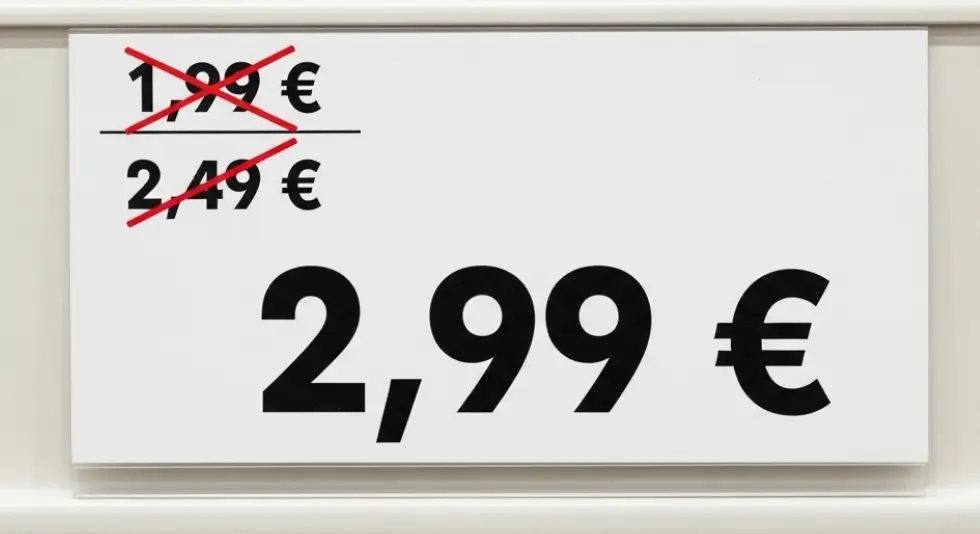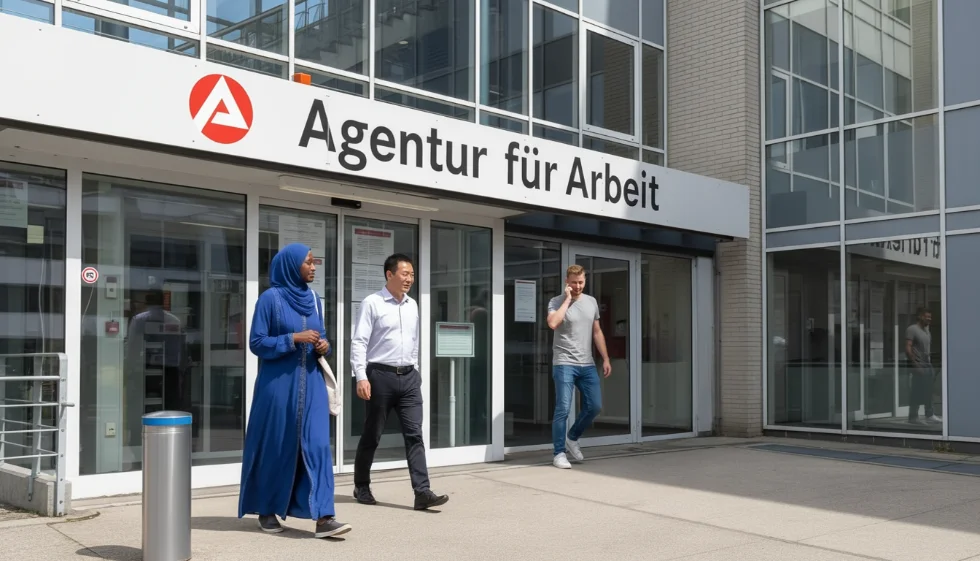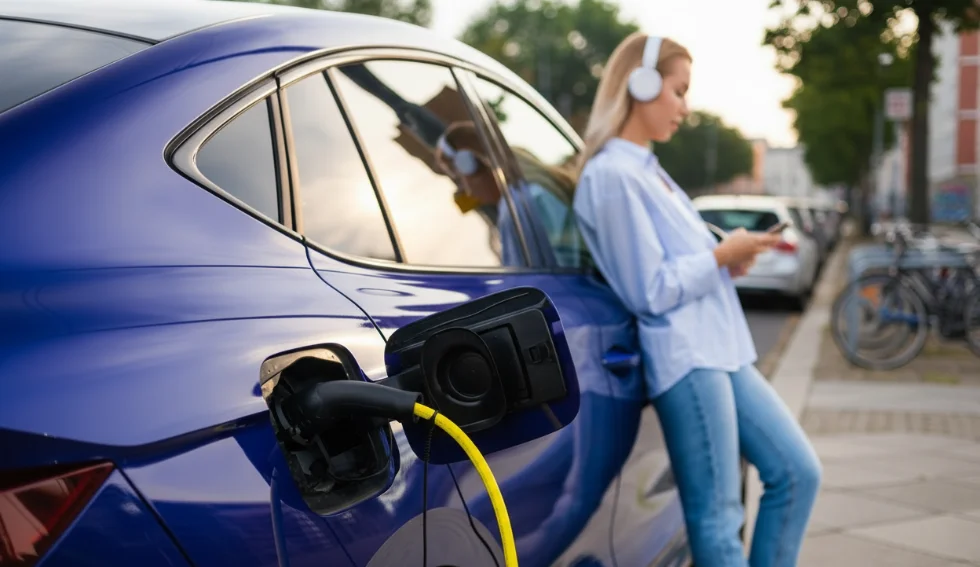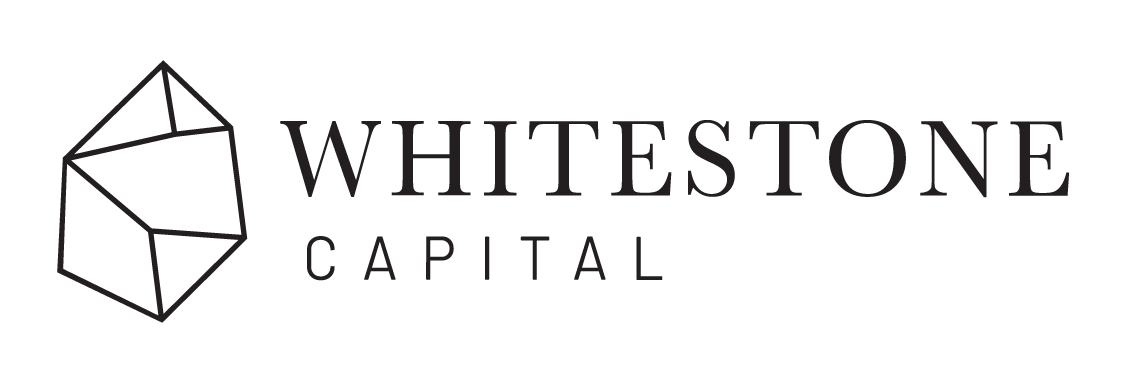The Decline Begins with Numbers
The majority has long felt it: We are sliding economically. No complex statistics are needed for this—a walk through city centers is enough: shops close earlier, new stores barely survive, even large retail chains are struggling.
Headlines confirm Germany’s economic situation in 2025: In the first half of the year, nearly 12,000 insolvencies were recorded—the highest in a decade.
According to surveys, 62 percent of Germans expect further deterioration, while only 14 percent still hope for improvement. That sounds grim, but given the numbers, it’s more realistic than pessimistic.
For two consecutive years, the gross domestic product has shrunk—2023 by -0.3% and 2024 by -0.2%. For 2025, leading institutes predict at best 0.2–0.3% growth—effectively a recession in Germany under a different label (IfW Kiel).
Those who read the numbers soberly will see: The downward trend has been ongoing for years, not just since yesterday.
The industrial production paints the same picture. Month after month, new declines, even more pronounced in year-on-year comparisons. The values are now at lows typically seen only in true crises—like during the Corona lockdowns or the financial crisis.
For a country that thrived on its industrial core for decades, this is not a peripheral issue, but a warning signal—comparable to an engine suddenly running at half speed.
That’s not even the whole truth: The measured inflation (HICP) was recently around 2%, but the perceived inflation among households is closer to 3.1%. In real terms, this means: Economic output is shrinking more than official headlines suggest. The feeling of declining purchasing power is not just a gut instinct—it can be concretely confirmed, for example, through the EY Consumer Survey, where the majority of consumers report having less room for spending.

Worse than expected: In GDP calculations, every government expenditure counts as “value creation.” So, when new civil service positions are created, the gross domestic product rises on paper. But these positions produce no new goods and create no direct wealth.
They increase the government share, but they don’t generate the value added of an exported industrial product or a fully utilized factory. On paper, the economy grows—but not necessarily in substance.
The image of a “wealthy nation” and an unbeatable export power was convenient. One could lean back, believing Germany was inherently strong. The reality: For years, too little was invested in infrastructure, technology, and education.
While new chip factories are being built in the USA—with investments in the hundreds of billions—Germany often debates locations for years.
In short: They build there; here, we mull over concerns—a difference that costs competitiveness.
The real problem isn’t that there were two bad years. The real problem is the direction. Many are realizing: This isn’t a small dent that will fix itself, but a longer phase in which we’re losing ground internationally.
Unpopular truths were rarely spoken—for example, that our energy policy incurs significant costs or that the labor market cannot remain stable without immigration. We’re already seeing the consequences today.

Particularly critical is the declining competitiveness. According to the international IMD ranking, Germany is only ranked 24th by the end of 2024. Countries like Switzerland, Denmark, or the Netherlands are far ahead:
Lower government shares, better infrastructure, predictable investment conditions. Germany, on the other hand, is losing ground in key areas—digitalization, energy prices, taxes, and planning security. Those who want to invest quickly notice: The difference isn’t academic but decisive in everyday life.
The pattern: We spend a lot of money, but not where it creates the future. Billions flow into bureaucracy, social benefits, or new administrative positions. Meanwhile, funds are lacking to repair bridges, modernize schools, or build technology hubs. It’s like painting the facade while water pours through the roof unchecked. In the short term, it looks neat—long-term, the building loses stability. And that applies to the location Germany.
How This Happened
As early as 2018, economists like Dr. Daniel Stelter warned: We overestimate job security, purchasing power, and wealth. We save incorrectly—often in savings accounts or life insurance, which lose real value every year due to inflation.
We underestimate the hidden debts from pensions, retirement benefits, and healthcare. These obligations are not abstract; they will come due in the coming years. Contribution rates are already rising to keep the system stable. This further reduces net purchasing power—and the burden shifts to the younger generation.

Instead of counteracting these developments, we’ve settled into a politics of convenience. Major future issues were postponed or covered up with symbolic projects. Instead of investing in infrastructure, education, and qualified immigration, we’ve managed and compensated. The result is visible: crumbling roads, slow internet, declining performance in schools and universities. And a migration policy that brings high numbers of immigrants but focuses too little on labor market integration.
An example: While countries like Canada target skilled workers and offer them quick paths into the labor market, in Germany, it often takes years for qualifications to be recognized. During this time, people contribute to the system but cannot productively use their skills. This creates frustration on both sides—for immigrants and for companies desperately seeking staff.
It’s like a slow erosion of substance. We don’t see the consequences in a single shock but in many small setbacks: delayed trains, overcrowded schools, overwhelmed authorities, rising health insurance contributions. Each issue may seem tolerable on its own—together, they show: We’ve consumed past prosperity without renewing the foundation for the future.
Is the Debt Brake to Blame?
One of the most popular narratives is: “The debt brake prevents everything good.” It sounds catchy but is wrong. Other countries show that excellent infrastructure can be built despite strict budget discipline and lower debt. The key isn’t the amount of spending but how it’s used. Where prioritization and efficient investment occur, modern roads, fast networks, and a future-oriented education system emerge.
Sweden is a case study. In the early 1990s, the country was in a deep crisis: banks were faltering, public debt soared, and confidence in the currency was severely damaged. Instead of piling on more debt and postponing problems, the government implemented tough reforms. The budget was consolidated, inefficient structures dismantled, and subsidies cut.

At the same time, money was targeted toward education, digitalization, and future-oriented industries. The result: Sweden emerged from the crisis much earlier than many other European countries, regained trust, and now has a solid fiscal foundation.
The real danger lies not in the debt brake but in the habit of covering structural problems with ever-new loans. This only pushes the bill forward—and makes it bigger each year.
Already today, the German government spends around 37 billion euros on interest payments annually—more than for education and research, around 21 billion euros. Money that is urgently needed elsewhere. At the same time, political dependence grows: on low interest rates, investor sentiment, and markets that could lose confidence at some point.
What we need is a completely different culture of spending and investing. It shouldn’t be about producing short-term headlines but about whether an expenditure creates measurable benefits in five or ten years. Every euro spent from the public budget must be evaluated for whether it delivers a return—be it through higher productivity, better infrastructure, or more educational opportunities. Only this creates the foundation for future prosperity.
Emotion Over Evidence—It Backfires

Germany has long become a feelings-driven society in many debates. Outrage replaces calculation, moral narratives dominate headlines—even on issues that demand hard facts.
Whether it’s energy policy, migration, or the economy: decisions are increasingly made with reference to “attitude,” not data. While surveys show that citizens perceive inflation as higher than officially measured, politics adjusts its communication to the feeling rather than soberly analyzing the causes—like energy prices or tax burdens. The result: Perception drives policy, instead of policy correcting perception.

We’ve maneuvered ourselves into a feelings-driven society. Gut instinct increasingly trumps sober analysis. In the media, and even in parts of academia, activism has gained the upper hand over evidence. This is particularly evident in energy policy. There, narratives are taken more seriously than robust calculations. Study parameters are adjusted until the desired result emerges. Reality checks are avoided because they risk showing that promises are unsustainable.
A core issue lies in funding: Research in Germany is almost exclusively financed by state funds. This inevitably makes it politically steered, as funding goes to what fits the agenda. Critical voices or alternative approaches struggle to be heard.
At the same time, practitioners—those who operate power plants, maintain grids, or navigate approval processes—are often not at the table in key discussions. This leads to a lack of practical sense.
The result is ambitious goals that shine in political communication but collapse under practical hurdles. Anyone who wants to build a wind turbine or a power line knows how many years approvals and construction take in Germany.
Add to that simple physics: Energy cannot be stored or transported at will. If these basics are ignored, even the slickest PowerPoint presentations are useless.
Examples of this “green at any cost” thinking abound: The rapid nuclear phase-out despite lacking storage technologies, the ban on new oil and gas heating systems from 2024, which was only softened after massive resistance (Tagesschau), or the dogma of completely abandoning nuclear power while even France and Finland build new reactors.
The pattern is also visible in prominent non-energy projects. The Berlin BER airport was opened in October 2020 after an originally planned opening in 2011—after 14 years of construction and total costs exceeding 7 billion euros.
Stuttgart 21 is a flagship project for cost overruns: From an originally agreed funding cap of around 4.5 billion euros, costs have risen to nearly 11 billion—more than double.
These cases symbolize a culture where announcements matter more than solid planning and execution.
This creates a vicious cycle: Politics promises grand transformation, science delivers the matching models, and reality is left out. In the end, citizens and businesses lose trust because they notice the gap between promises and actual outcomes.
Cultural Problem: Preemptive Obedience
From the boardroom to the parent council, the same pattern emerges: Open dissent is avoided, criticism is hushed because it’s inconvenient. Instead of speaking plainly, nodding prevails. People opportunistically agree, demand new subsidies, or quietly hope things will resolve themselves. This silence is not accidental but systemic—and it weakens us.
For a long time, we could afford this because economic growth acted like a fog obscuring missteps. As long as coffers were full, high tax revenues masked the failures. But now, with the cushions depleted, the elephant in the room becomes clear. And this elephant has many faces: rampant bureaucracy, a noticeable lack of competence in key positions, and incentive systems that reward bad behavior instead of sanctioning it.
Look at everyday life: The ifo Institute reports in a survey of German business leaders that employees spend about 22% of their working time on bureaucratic tasks, such as reporting, documentation, or compliance requirements. According to a DIHK survey 2024, over 70 percent of companies now see bureaucracy as the biggest obstacle to investment.
Citizens experience the same with authorities that take months to process simple tasks—from new ID cards to building permits. The same pattern applies in ministries: Those who produce short-term headlines are rewarded; those working on long-term reforms often remain invisible. Managing trumps shaping.

This is particularly evident in subsidy programs. Politicians can shine instantly with a new funding pot, cut ribbons, and demonstrate action. Whether these programs ever work, whether they truly strengthen competitiveness or reduce bureaucracy—that only becomes clear years later, when no one remembers. The short-term reward goes to the political actor; the long-term costs are borne by citizens and businesses.
How absurd this system is can be seen in a real-world case: An entrepreneur selling toner cartridges runs a warehouse without a single ladder. Yet regulations force him to appoint and regularly train a “ladder officer.” Bureaucracy can hardly get more grotesque. Those familiar with such examples understand why trust in the location is waning.
This creates a culture of looking away. Decisions are postponed, risks downplayed, mistakes glossed over. But problems don’t disappear when ignored—they grow. The longer they’re left unaddressed, the harder and more expensive their solution becomes. Without clear words, courage for dissent, and willingness to speak uncomfortable truths, this knot won’t be untied.
Political Incentives: Why Good People Make Bad Decisions
The German list system in politics doesn’t reward courage or judgment but loyalty. Those who vote against the party line risk not only their list position but their entire career. This creates a climate where MPs often raise their hands against their better judgment—not because they’re convinced, but because they know: Deviant behavior is punished.
That dissenters are quickly marginalized is shown time and again. A prominent example was the vote on the Greece bailout packages about a decade ago. MPs who voted against their faction’s line and pointed out financial risks lost key committee posts or found themselves far down the next list. The message was clear: Step out of line, and you risk your political survival.
Add to that the material side. A Bundestag MP currently receives a monthly compensation of 11,833.47 €—about 2.5 times the average gross monthly earnings of full-time employees in Germany (4,701 € in 2024; Destatis). A mandate offers high security, even without years of experience in the private sector. This creates incentives that don’t always attract the best talent. Critics say the system rewards conformity over excellence.

This is particularly evident in the big issues of our time—energy policy, fiscal policy, migration policy. Here, many MPs vote with their faction despite expressing doubts behind closed doors. The problem is structural: Parties control access to mandates. Those who want to survive politically conform. This creates uniformity that impoverishes debates and prevents real corrections. Instead of lively discussions, there are often rubber-stamp sessions where the outcome is predetermined.
But there are alternatives. Countries like Switzerland show how direct democracy can invigorate politics and tie decisions more closely to the will of citizens. More personalized responsibility—MPs who truly represent their constituencies, not just the party line—would encourage the courage to stand up for one’s positions. And a clear focus on the state’s core tasks—rule of law and internal security—would help refocus political action on the essentials. Instead of micromanagement and piecemeal interventions, we need more trust in citizens and the economy.
Germany has the chance to turn a rigid system into a learning one. But that requires the courage to limit the power of party apparatuses—and return real responsibility to MPs and citizens.
Generational Perspective Without Fairytales
The young generation is by no means as uniform as headlines often suggest. Yes, there are highly politicized groups focused on climate and identity issues that get a lot of attention. But alongside them, another group is growing: quiet, performance-driven, pragmatic, and internationally oriented. Young people who invest in their education, speak multiple languages, gain international experience—and are mobile enough to leave Germany if they see better opportunities elsewhere.
This is the warning signal. When people in their mid-twenties seriously consider moving to Zurich, London, Singapore, or the USA, it reflects a loss of trust in domestic structures. This isn’t a fringe phenomenon: According to the Bertelsmann Foundation, around 150,000 skilled workers emigrate net each year. Many report spending too much time on formalities in Germany and too little on performance. Career paths seem sluggish and unclear, while elsewhere, speed, clear goals, and advancement opportunities prevail.
The difference is also measurable financially: A university graduate in IT earns a median of about 90,000 CHF gross in Zurich—in Berlin, it’s barely 55,000 euros according to Destatis. Add to that significantly lower taxes in Switzerland or US states like Florida. The net difference quickly amounts to 20–30 percent—a gap that shapes careers.

If Germany wants to retain its talent, it’s not enough to launch new funding programs or strategy papers. What matters are the everyday framework conditions:
- Reliability, so that promises are kept.
- Speed, so that approvals don’t take years.
- Advancement opportunities, so that performance is rewarded—not the right party membership.
- A culture where success is recognized, not viewed with suspicion.
Performance, speed, reliability, advancement—these are the factors that count. If these basics aren’t met, it’s no surprise that the next generation seeks its fortune elsewhere. And the numbers show: They’re already on their way.
The Distribution Tunnel Vision
A glance at German TV talk shows acts like a magnifying glass: Discussions almost exclusively revolve around redistribution. Who gets more? Who should give up something? Which group is considered “fairly” treated, and which is supposedly not burdened enough?
Rarely addressed is the actual basis of any prosperity debate: value creation. Without rising productivity, without investments in capital stock and innovation, every justice debate becomes a zero-sum game. You’re just distributing what’s already too scarce.
Those who demand higher taxes “on the right people” without simultaneously reducing bureaucracy, unleashing investments, and making work easier are sawing off the branch we’re all sitting on. Higher taxes may bring more revenue in the short term. But if companies invest less and skilled workers leave, the pie to be distributed shrinks in the medium term. You can only milk a cow as long as it’s fed.

How big the differences in framework conditions are is shown by a simple calculation: A married couple with a taxable income of 400,000 dollars pays around 92,679 dollars in taxes and levies in the USA—for example, in Florida. That’s a total burden of about 23.2 percent: roughly 75,076 dollars in federal taxes (18.8 percent) plus 17,603 dollars in FICA contributions (4.4 percent) for Social Security and Medicare. There’s no state income tax in Florida.
In comparison: A married couple with 400,000 euros in income pays around 146,000 euros in income tax and about 62,000 euros in social contributions in Germany. Together, that’s a total burden of around 52 percent. The difference is striking: While a significant portion of income remains for investments, consumption, or savings in the USA, more than half goes to the state in Germany.
For performance-driven people and companies, this sends a clear signal: Those who want to grow and shape seek locations with better conditions.
This logic is as old as economics itself: You can only distribute what was earned first. Countries that understand this focus on strengthening productivity and competitiveness.
Germany, however, is increasingly entangled in detailed regulations and redistribution debates—endangering the very foundation that makes social security possible.
Energy Policy on the Brink

Wanting to supply an industrial nation solely with wind and solar energy while phasing out nuclear power and soon coal—without secured alternatives, storage, stable grids, reserve capacities, and base technologies—is not visionary; it’s destructive. Such actions endanger the foundation of our industrial value creation and thus prosperity, jobs, and societal stability.
Energy policy must pass three simple but crucial tests:
- Reliability: Electricity must be available at all times, not just when the sun shines or the wind blows. Without backup systems, every company and household is at risk. Germany recorded a total of 158,360 power supply interruptions in 2023—a warning sign for reliability.
- Affordability: Energy prices must not be permanently much higher than in comparable countries. In 2025, German industry pays around 18–20 cents per kWh—more than double what companies pay in the USA (~8 cents) and significantly more than in France (~12 cents).
- CO₂ effectiveness per euro invested: It’s not about who makes the grandest promises but where each euro invested achieves the greatest emission reduction. In Finland and France, for example, nuclear power reliably reduces emissions—in Germany, emissions rise again during transition phases due to higher gas and coal use.
The rest is rhetoric. Political speeches, lofty goals, or new action plans change nothing about physical realities. Without storage technology, robust grids, and reserve capacities, the energy transition won’t work—no matter how often it’s invoked.
Other countries combine renewables with nuclear or modern gas and storage solutions. Germany, however, is knowingly steering toward an energy policy experiment that is expensive, risky, and fundamentally destructive.
Education First—Or Germany Loses Its Core
The foundations for any high-performing country start with the simplest things: reading, writing, arithmetic. Early childhood education is crucial here. Language skills must not be optional—they must be mandatory. Without language, the key to education, integration, and professional success is missing. Already today, according to the IQB Education Trend, around 25 percent of fourth graders fail to meet minimum reading standards—a warning signal.
Building on this, a clear performance principle is needed, no excuses. Performance must be recognized and rewarded. At the same time, children from disadvantaged families need real support so that background doesn’t determine their future. Equal opportunity doesn’t mean leveling differences but ensuring everyone has access to the same foundations.
Vocational training also deserves more appreciation. The dual education system is internationally recognized, yet it’s losing appeal domestically. To secure skilled workers, vocational training must be financially and socially valued.

At the same time, study funding should be targeted at STEM fields—mathematics, computer science, natural sciences, technology. This determines whether Germany remains competitive in key industries. According to the latest STEM Spring Report 2025 by the Institute of the German Economy, 163,600 STEM positions remain unfilled—a clear warning for Germany’s innovation capacity.
Simultaneously, immigration must be consistently skill-based. It’s not enough to vaguely talk about skilled workers. Clear criteria are needed: recognized degrees, proven professional experience, language proficiency, signed employment contract. Only then does immigration become a gain for society and the economy—not another bureaucratic and ongoing problem.
The message is simple: Without an education and integration turnaround, there’s no productivity turnaround. Neglecting these basics jeopardizes the competitiveness of future generations.
Migration: Honest Calculations, Smart Steering
Germany needs immigration—but it must be labor-market oriented. It’s not enough to talk abstractly about “skilled workers” when, in practice, too few actually enter employment. Decisive are criteria systems that clearly measure: What net contribution does someone make? What qualifications do they have? What prospects do they bring? Other countries are already doing this. Canada, Australia, and New Zealand manage immigration through point systems, considering education, professional experience, language skills, and age.
A look at Canada shows how effective this can be. Immigrants there go through a transparent process: Points are awarded for completed studies or vocational training, professional experience in in-demand sectors, proficiency in English or French, and a concrete job offer. It’s clear during the application process whether the criteria are met.
Those accepted can usually start working within months—not after years of recognition bureaucracy. The result: Immigration is seen not as a burden but as an enrichment. While in Canada, according to CIC News, nearly 76% of newcomers find employment through the Express Entry system, the employment rate of refugees in Germany in their first year is below 10% (IAB-BAMF-SOEP-Panel).
Germany lacks a functioning entry system. Those who come here must have the opportunity to start working quickly. This requires swift recognition of qualifications, mandatory and efficient language courses, and a digital administration that doesn’t waste months on paper files. Every day without employment costs the state money and slows integration—frustrating people who want to work.

Equally important is the principle of fairness. Those who don’t work must not be better off than those who get up at six in the morning to support their families with honest work. This isn’t harshness but a basic condition for societal cohesion. Those who perform must feel it’s worth it. Those who need support should get it—but always with the goal of achieving employment and independence.
Only if immigration is steered this way does it become a win for all: for the economy, which urgently needs skilled workers; for society, which wants to ensure stability; and for the people who want to build a future here.
Bureaucracy: From Lip Service to Chainsaw Mode
Regulation in Germany so far works almost exclusively in one direction: New rules and regulations are constantly added—old ones are rarely repealed. This is where a radical change is needed. Each year, not only should a fixed quota of regulations be introduced, but also repealed. This creates an incentive to review existing rules for necessity and effectiveness.
An effective tool for this is sunset clauses. Laws and regulations would not remain in force indefinitely but would automatically expire after a set period unless actively reviewed and renewed. This forces administration and politics to regularly check whether a rule still makes sense—or is long outdated.
Equally crucial is a consistent digital-by-default principle. Processes should run digitally by default: simple, transparent, and traceable for all involved. This saves time and costs—and prevents companies from having to fill binders just to submit simple applications.
According to the OECD Regulatory Policy Outlook, Germany ranks only in the lower midfield of industrialized nations in the digitalization of administrative processes.

And finally, there needs to be real administrative liability for missed deadlines. A clear “approved if no response” rule would ensure applications don’t languish in drawers indefinitely. Those who invest need reliability—not limbo.
In practice, building permits in Germany often take much longer than officially estimated. The BDI notes that for larger projects, processes frequently take over twelve months. In international comparison, this is glaring:
According to the World Bank, Germany takes an average of about 120 days, while countries like Denmark issue permits in less than 30 days.
Short timelines are thanks to digital application portals, fixed response windows, and clear responsibilities. The result: Elsewhere, houses and projects are built while Germany’s paperwork piles grow.
The goal isn’t to “rush sloppily” but to become reliable and predictable. Investments flow where projects are actually implemented. Countries with simple approval processes and clear deadlines attract capital and jobs. Germany, however, risks falling further behind due to its regulatory overgrowth.
Subsidy Madness Instead of Impact
Not a single euro should be spent without clear evidence of impact. Especially for infrastructure and education investments, the rule must be: Every use of taxpayer money is measured by metrics—cost, time, output. Whether it’s building a school, repairing a bridge, or expanding digital networks: In the end, it must be verifiable whether the goal was achieved and whether the euro spent delivered the promised benefit.
If debt is taken on, it should only be for projects that generate real returns. Returns here don’t mean profit in a business sense but increased productivity, a broader tax base, or measurable societal effects like higher graduation rates. Everything else belongs in the regular budget—or should be avoided altogether.
Subsidy programs must be radically thinned out. Today, there’s a funding tool for almost every issue—often complex, expensive to administer, and with minimal impact.
A negative example is the subsidy for electric cars: Between 2016 and 2022, around 9.5 billion euros went into purchase premiums for electric and hybrid vehicles. According to recent research in the journal Environmental and Resource Economics, the CO₂ avoidance costs—the cost per ton of CO₂ saved—are about 870 €/ton for battery electric vehicles (BEVs) and even 2,470 €/ton for plug-in hybrids (PHEVs)—a multiple of what other climate protection measures achieve.

Insulation subsidies are also no shining example, costing billions but often showing results only after decades. According to an analysis by the Institute of the German Economy, the actual avoidance costs for thermal insulation measures can reach up to 4,936 € per ton of CO₂ saved—a multiple of what other climate protection programs achieve.
For 2024 alone, around 16.7 billion € for building subsidies were allocated from the Climate and Transformation Fund. Studies show a wide range of CO₂ avoidance costs: For typical residential building renovations, they range from a few dozen euros to over 200 € per ton—sometimes a fraction of more cost-effective alternatives. As a benchmark, the Federal Environment Agency cites societal CO₂ cost rates of around 300 € per ton for 2024 (with upper damage costs of about 880 €).
Taxes Instead of Subsidies
Instead, we need a simple tax system that facilitates investments and clear rules for faster depreciation. Those who invest should be able to claim their capital quickly for tax purposes. This creates incentives to pursue future-oriented projects instead of waiting for subsidies.
The principle is simple: Every euro must be measured by its impact. Only this creates a culture of responsibility where results matter, not headlines.
Act Instead of Hope
What’s needed now? Above all, clarity and courage—in politics, business, and society. The recipes aren’t complicated; they just require consistency:
- Courage to dissent: In the workplace, associations, or parent councils—wherever decisions are prepared or discussed. It’s no longer enough to lower your eyes and go along. Those who see issues must name them factually but audibly. Progress begins with dissent, not silence.
- Set priorities: Time, money, and attention belong where productivity is created—in education, infrastructure, research, and entrepreneurship. Everything else is secondary. Countries like OECD leaders invest disproportionately in these areas—and that’s where their growth advantage lies.
- Resilience to outrage: Not every wave of indignation on Twitter or TikTok is a political earthquake. Those with responsibility must not be thrown off course by every shrug. Stability comes from staying the course—even against headwinds. This applies to companies as much as to politics.
- Coalitions of the reasonable: Medium-sized businesses, municipalities, and practitioners from business and administration belong at one table. Their experiences are more valuable than many strategy papers. Practical results should be made publicly visible—clearly and pragmatically. We need fewer glossy reports and more lived reality.
- Promote talent: Young people need education, internships, and real responsibility—not “after the next reform” but now. They are the foundation for everything else. Every euro invested in education pays off twice: through higher productivity and trust in the location.
- Honesty in investing: Companies and individuals must soberly assess whether projects in Germany still make financial sense. Those who find the conditions lacking will move capital abroad. Some will even personally draw the consequence and emigrate. This is a taboo topic in many debates—but it’s reality. Bundesbank data already show German companies investing over 135 billion euros abroad annually. Capital is mobile—and it votes with its feet.
Act instead of hope: Only if we take these steps does Germany have a chance to shift from managing to shaping.
Course Correction Now—Or Pay Double Later
Germany needs less state in the details, more state in the core. Not more symbolic laws that generate headlines, but operational excellence in the tasks that truly matter: security, rule of law, education, infrastructure. Instead, we often see the opposite—endless detailed regulations and moral appeals while bridges crumble, schools lack staff, and approvals take years.

We need less moral rhetoric and more math. Not felt truths but clear calculations and evidence must form the basis of policy and administration. Whether in energy policy, finance, or migration: What matters isn’t what sounds good but what measurably works.
And it doesn’t start in talk shows or election programs but with ourselves. With the courage to clearly state unpopular things. With insistence on evidence, even when it’s uncomfortable. And with the willingness to earn prosperity before distributing it.
If we don’t do this, the correction will inevitably come—harsher, with fewer options, and more coercion. In the end, a generation will quietly turn its back on us, seeking its opportunities elsewhere. Already today, citizens and companies are increasingly investing abroad, where planning security, energy prices, and tax burdens are more favorable.
According to the Bundesbank, German companies’ foreign investments reached a high of over 135 billion euros in 2023. Capital is mobile—and it flows where value creation is possible.
A course correction is inevitable. The only question is: Do we want to shape it now—or endure it later under duress and at far higher costs?








